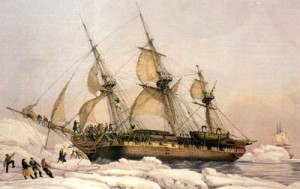The first thing I was told about Antarctica is that she is a continent like no other. I’ve travelled through over 60 countries and have come to know all the other continents. To me she is how Mount Everest is to every mountaineer, holding a dark and dangerous attraction. There is a phrase used and known to all Antarcticans to explain days and weeks of delay in Antarctica, being snowed in by bad weather – ‘This is Antarctica’ – abbreviated to TIA. I’ll probably come to use this a lot.
British people moan all the time about the weather. Its a conversation-filler. We moan when it rains and we moan when it doesn’t rain. We moan when it snows, in fact the whole country skids along a narrow icy country lane coming to an abrupt and unnecessary standstill.

I am not going to moan or blame bad weather. It seems TIA can work both ways- for the benefit and detriment of all it commands and the hand of good fortune has struck me again.
The Astrolabe 2, a French polar vessel (and my ticket to Antarctica) has spent a month stuck in a floating ice pack around Antarctica, being unable to return to Hobart Port in Tasmania, therefore delaying my departure. So it seems I’ll be back in Lincolnshire for one last farewell at the family’s regular and traditional christmas programme, where my father makes an Indian banquet each and every Boxing day. Another stroke of good luck came as I have been switched to the ‘Aurora Australis’ – an Australian Ice-breaker (http://en.wikipedia.org/wiki/Aurora_Australis_(icebreaker) – which means although I will probably be enjoying an Aussie Barbecue out on the deck instead of French 2005 Château Mont-Redon, Côtes-du-Rhône Rouge, I will be spared from Astrolabe 2’s dark and notorious secret: it is a flat-bottomed vessel and like any sorcerer’s emetic it is known to induce frequent bouts of vomiting from sea-sickness among even the most hardy of sea-farers as it rolls over the southern ocean’s swell, which Dame Ellen Macarthur once described to me as ‘waves the height of houses’. It seems it is one thing to survive Antarctica, but something else to still be present at the dinner table on day 5 aboard Astrolabe 2. The french scientists have fondly renamed her, ‘Gastrolabe’, in honour of this formidable rite of passage. I was looking forward to this challenge, but sadly it will have to wait until my return.
I lean back in my chair at home, enjoying the last joys and freedom of a fridge of fresh food, comfortable and warm with Mishi, our 11 week old Siberian Husky puppy, who bows and yawns in mutual contentment before falling fast asleep on my lap, kicking and dribbling her way through the first stages of sleep.
[twocol_one] [/twocol_one] [twocol_one_last] [hana-flv-player video=”http://www.alexanderkumar.com/wp-content/uploads/2011/12/mishi.flv” width=”400″ height=”330″ description=”Mishi-Bear, the new addition to our family” player=”1″ autoload=”true” autoplay=”false” loop=”false” autorewind=”true” /] [/twocol_one_last]
I am known among my friends to be a hoover for and bearer of useless facts. So to finish this entry- an interesting useless fact for you all:
The original Astrolabe vessel featured in the image, was commanded from 1826-29 and again in 1837-40 by Jules-Sébastien-César Dumont d’Urville, the first man to set foot in Antarctica. Jules DDU named the commonest breed of penguin found on the Antarctic continent, the ‘Adelie’ penguin, after his wife, ‘Adélie d’Urville’.

Astrolabe in the 1800s, Stuck in Ice (http://www.south-pole.com/p0000052.htm)
There it is. Useless.
Crack open a can of XXXX larger over the BBQ and have an Aussie Christmas.
C’est la vie, Au revoir et Bon route, I think.
Merry Christmas one and all.
